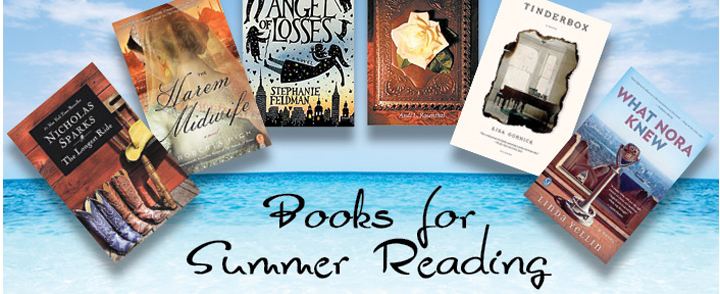By Diana Brement, Jewish Sound Columnist
Even when work is going well, personal problems always seem to rear up. At least that is how it goes for these female and Jewish protagonists — whether in the 21st or 16th centuries — featured in a crop of newly published novels.
Sharing some superficial similarities, four of these books take place in New York and involve getting to the bottom of an enigma.
Stephanie Feldman’s “The Angel of Losses” (Harper Collins, cloth, $25.99), coming in August, and Andi Rosenthal’s “The Bookseller’s Sonnets” (John Hunt, cloth, $24.95) are so similar in theme, though different in style and structure, they make an interesting pair. Weaving together past and present, they take on issues of identity, Holocaust and family.
Literary and intelligent, “The Angel of Losses” opens as Marjorie and Holly, two young sisters, listen to their grandfather tell the story of The White Magician. Many years later, Marjorie is steeped in academia and Holly, married and pregnant, has become Orthodox.
Returning to their childhood home to retrieve some books, Marjorie discovers her grandfather’s notebook in which he has written not about a magician, but a “White Rabbi,” an Elijah-like figure from Jewish folk tradition. Marjorie puts aside her dissertation to solve this mystery, delving into theology, history, mysticism folklore and family.
“The Bookseller’s Sonnets” also features a mysterious notebook, family history, and Judaism, but focuses more on the Holocaust and the issue of preserving survivors’ stories. A curator at New York’s Holocaust museum, Jill Levin receives an antique manuscript from an anonymous donor. It appears to be the diary of Margaret More, daughter of Thomas More, who served as Henry VIII’s legal adviser. The donor then sends a series of letters, parceling out the story of how the manuscript came into her possession during World War II. While trying to authenticate the manuscript, Jill juggles her family’s rejection of her non-Jewish boyfriend, her officemate’s marriage problems, and her grandmother’s illness. This reviewer is putting aside a few editorial quibbles to recommend this imaginative and compelling well-told story.
In Linda Yellin’s fast and funny — and very New York — novel “What Nora Knew” (Gallery, paper, $16), Molly Hallberg is trying to climb the ladder of success and be happy with a secure-yet-dull relationship while her family nags her about marriage. The 39-year-old divorced writer can’t seem to handle an assignment to write an article about Nora Ephron-style romance. She can’t find romance for herself, and she can’t identify it anywhere else, even when the right guy is staring her in the face.
In the more serious “Tinderbox,” by Lisa Gornick (FSG, cloth, $26), Myra is a Manhattan psychotherapist (like the author) whose serene and programmed life is knocked out of balance when she agrees to hire Eva, a Peruvian immigrant, as live-in help, sight unseen. Then her neurotic son, his critical Moroccan-Jewish wife, and their son move in, too. Their lives slowly begin to swirl around Eva, who comes from a mestizo (native) community in the Amazon that claims Jewish roots. As the mystery of Eva’s past becomes clear, the young woman becomes unglued, as does the rest of the family, leaving Myra and her daughter to do damage control. Gornick writes intelligently and compassionately about a family trying to shake off the past and build a better future.
Jumping back a few hundred years, “The Harem Midwife” By Roberta Rich (Gallery, paper, $16) takes up where Rich’s first book, “The Midwife of Venice,” left off, but easily stands alone. Hannah and Isaac Levi have fled 1579 Venice for Constantinople with the child they rescued from a plague-stricken family. Hannah’s midwifery skills have gained her entrance to the royal harem, where she discovers the new concubine is Jewish. Her plan to help this woman escape, at great risk to her family, becomes Hannah’s next big adventure. Rich vibrantly captures the historical setting and palace intrigue.
Finally, massively best-selling author Nicholas Sparks features his first Jewish characters in “The Longest Ride” (Grand Central, cloth, $27). Ira Levinson, a 90-year-old man, is trapped in his car after an accident in a snowstorm. Injured and drifting in and out of consciousness, he reviews his life story in conversations with the apparition of his dead wife, Ruth. Their story is contrasted with an unlikely young couple, Sophie and Luke. She’s a brainy college student and he’s a rodeo rider. While Ira and Ruth’s characters seem to lack a certain depth, and the shifting viewpoints can be frustrating, the reader will want to keep reading to discover drama that brings the two couples together at the very end.
